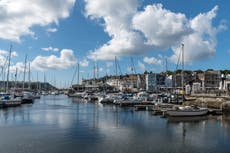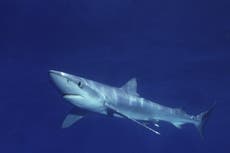Rowers stranded at sea for five hours rescued after boat capsized and sank
Alert signal used ‘can really make the difference between being saved and being lost’, HM Coastguard says

Two rowers have been rescued after being stranded in the Atlantic Ocean for five hours when their boat capsized and sank.
The crew members got into difficulty around 800 nautical miles from the tip of Cornwall, according to the UK coastguard.
They had come from the Faroe Islands, a Danish island that sits between Iceland and Norway.
HM Coastguard said it received a distress alert from the transatlantic rowing boat shortly after 6.10am on Thursday.
It quickly established the two rowers were on a liferaft after their vessel had capsized and subsequently sunk.
The coastguard launched a rescue mission with the RAF and the closest merchant vessel to the rowers.
The RAF deployed a Poseidon P8 aircraft, a maritime patrol and reconnaissance plane, which left to find the crew at around 11.30am. It is one of the first times this type of aircraft has been used in a rescue mission in the UK.
The nearest merchant vessel went to the scene and rescued the crew members.
The rowers used an alert signal called an Emergency Position Indicating Radio Beacon (EPIRB) to contact authorities when they came into trouble at sea.
Rob Priestley from HM Coastguard said the system can “really make the difference between being saved and being lost”.
“This alert allowed us to quickly pinpoint where the crew was and to quickly coordinate the help they needed,” he said.
Mr Priestley added: “We are very grateful to the merchant vessel that stopped its busy schedule to rescue these survivors in very challenging weather conditions, and thankful to our friends at the RAF who provided such good support for this incident.”
Join our commenting forum
Join thought-provoking conversations, follow other Independent readers and see their replies
Comments





Bookmark popover
Removed from bookmarks